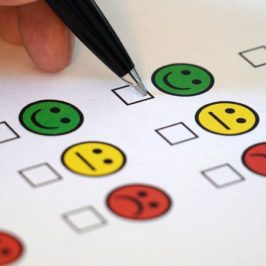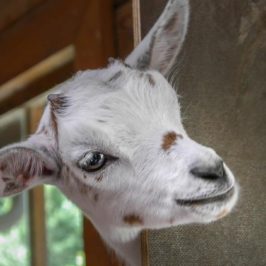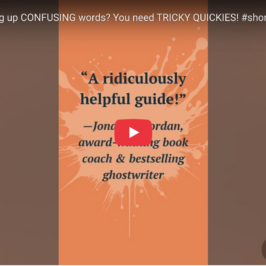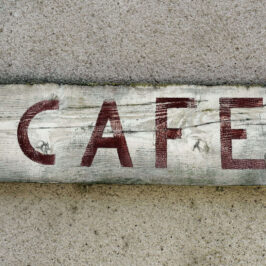
Why do authors and filmmakers misspell titles on purpose? Should you? Discover when misspelled titles of books and films work … and when they don’t.
How many books or movies can you name that have misspelled titles? By the time you’ve finished reading this article, you’ll be able to name loads! You’ll also know why this tactic can work if done well, why it doesn’t always work, and whether or not to misspell words in your book title.
If you’re a regular reader of my blog posts, you’ll know I don’t do things by halves. As faithful as ever to my curious and meticulous nature (perfect qualities for an editor/proofreader!), I did a lot of research for this post. I discovered that different kinds of intentional misspelling have their own terms. I know, surprising, right?! Let’s take a look.
Satiric misspelling and sensational misspelling
The two terms for intentional misspelling are satiric misspelling and sensational misspelling. As far as I can make out, there is some crossover between the two terms, but read on for a definition of each with examples.
Satiric misspelling
Satiric misspelling refers to the deliberate misspelling of a word or phrase as a rhetorical device (to persuade readers to view something from a certain perspective by using emotive, flamboyant or noteworthy language). Wikipedia gives a useful summary of different rhetorical devices, of which satiric misspelling is just one.
The technique of satiric misspelling employs intentionally mispelled words to convey a mood, emotion or political stance. Some examples of satiric misspelling are:
- Back to skool
- We was robbed!
- €urope/United $tates
Sensational misspelling
Sensational misspelling is the intentional misspelling of a word or phrase for special effect or impact.
Some brands employ this technique for marketing purposes as it makes them more memorable. Such brands include:
- Krispy Kreme Doughnuts
- Blu-ray
- Froot Loops
If you’d like to read more about why certain letters are substituted for others, take a look at the article ‘Xtreme Kool Letterz’ on the TV Tropes website.
Is it okay to misspell book titles and movie titles?
As you will see below, plenty of authors, screenwriters and directors have chosen to deliberately misspell their titles to create an effect or make a statement, be it emotional, comedic, political or something else.
But should you do this for your book?
As with many questions related to writing and publishing, it depends.
Well-established authors and moviemakers may be more likely to get away with this (i.e. be accepted by critics and their audience), especially if they’re known for being different or edgy (think Quentin Tarantino and Tim Burton, for example).
When considering an intentional misspelling in your book title, think carefully about whether it could be misconstrued as a typo by agents, publishers or your readers. Angela Hoy of Writers Weekly advises against it altogether. I think such a total ban isn’t necessary, but Hoy makes some valid points regarding why not to use deliberate misspellings, such as avoiding confusion.
If you’re self-publishing via Amazon KDP, something else to bear in mind is whether your book will be accepted by the system if your title contains a misspelling. This post on the KDP forum is a few years old now, so the situation may have changed, but it seems that misspellings used to be a blocker to publication on Amazon.
In short, don’t misspell your title for the sake of it or just to be funny or quirky. Think carefully about your reasons for doing so and the effect it will have on your audience. Run it by your network or a few friends whose opinion you trust and gauge their reaction.
Don't misspell your title for the sake of it or just to be funny or quirky. Share on XMovies and books with misspelled titles
Most of these examples of misspelled titles are sensational misspelling, some are satiric misspelling, and a few may belong in both camps.
Here are some of the more well-known examples, with a bit of background info.
Films with misspelled titles
American Dreamz (2006, directed by Paul Weitz)
The film’s title is the name of the show-within-a-show, a parody of American Idol or X Factor in which a contestant sings a ballad with the chorus, “American Dreamz… dreamz… with a Z.” The ‘z’ here works well as it mirrors the parodic nature of the film.
Beetlejuice (1988, directed by Tim Burton)
The antagonist (a ghost) is called Betelgeuse, after a star in the constellation of Orion, and it’s spelled correctly on his tombstone. The reason for the misspelling is unclear. Some people claim it’s to make it easier to pronounce, others say it’s to appeal to younger members of the audience, and others deduce it’s simply a creative decision by Burton to be quirky.
Boyz n the Hood (1991, directed by John Singleton)
A reference to Eazy-E’s (note this intentional misspelling!) 1987 song of the same name. According to The Atlantic, this film’s title is “a stylistic choice that signified the forging of an anti-establishment identity in rap music”.
Dumb and Dumberer: When Harry Met Lloyd (2003, directed by Troy Miller) and Dumb and Dumber To (2014, directed by Bobby Farrelly and Peter Farrelly)
These are the first and second sequels of Dumb and Dumber. The obvious joke here is that the misspelled words look as dumb as the two main characters. In my opinion, the first one works, but the second one doesn’t. Let me know in the comments whether or not you agree.
Inglourious Basterds (2009, directed by Quentin Tarantino)
The title is based on Enzo G Castellari’s 1978 film The Inglorious Bastards. Tarantino has been famously elusive regarding the reason for the misspelling. On different occasions, he has said that ‘basterds’ is phonetic and that it’s a ‘Quentin Tarantino’ spelling. He has also been known to say that he is never going to explain it. Tarantino is dyslexic, so some people think he misspelled it by mistake and the error stuck.
Terminator Genisys (2015, directed by Alan Taylor)
This misspelling of ‘genesis’ is presumably a merge of ‘genesis’ and ‘system’, although it is confusing and arguably an example of a misspelling gone wrong. The movie is one of the less revered films of the Terminator franchise. Would it have been more popular if the title had been spelled the more conventional way? We’ll never know!
Would Terminator Genisys have been more popular if the title had been spelled the more conventional way? From: Should authors misspell book titles on purpose? (with lots of examples) Share on XOther misspelled film titles
There are loads of other movies with intentionally misspelled titles, including:
- Antz
- Biutiful
- Bratz
- Defendor
- Do Knot Disturb
- Eletrick Children
- The Ferpect Crime
- Hunterrr
- Kalifornia
- Life is Ruff
- Luv
- Mo’ Money
- Mortal Kombat
- Once Upon a Time in Mumbaai
- Pardners
- Polisse
- School Gyrls
- Simon Sez
- Singh is Kinng
- Son of Rambow
- Tru Confessions
- Zeon: The Zequel
Books with misspelled titles
Everyone’s a Aliebn When Ur a Aliebn Too (2017, Jomny Sun)
As Alli Cruz found out, the misspelling and incorrect grammar in this title can make it tricky to request it in a bookshop or library, but that doesn’t make it not work as a title (did I use too many negatives there?). It’s a clever play on the way an alien might speak and brings some humour to the title, reflecting the tone of the book. It works!
Gangsta Granny (2011, David Walliams)
The spelling ‘gangsta’ is arguably no longer a misspelling, as it appears in Merriam-Webster and other dictionaries. However, it’s clear that Walliams has purposely used this spelling for comedic effect – the juxtaposition of ‘gangsta’ and ‘granny’ is funny, more so than if the book had been called Gangster Granny.
Pet Sematary (1983, Stephen King; also a 1989 movie directed by Mary Lambert and a 2019 movie directed by Kevin Kölsch and Dennis Widmyer)
The story goes that this book title was inspired by a sign some kids made for a pet cemetery behind King’s house. In the book, some kids do exactly that and are clearly unsure of how to spell ‘cemetery’. By using the same (mis)spelling in the title, King creates an unsettling atmosphere for the reader before they have even turned to the first page.
The Pursuit of Happyness (2006, Chris Gardner; movie released the same year directed by Gabriele Muccino)
If you haven’t yet seen Will Smith’s portrayal of Chris Gardner in the film version, I’d highly recommend it – bring a hankie. It’s one of my favourite films of all time.
The misspelled ‘happyness’ in the book and movie title is taken from a 1776 essay by Lemuel Haynes, arguing that the rights promised by the US Declaration of Independence to white people should also be offered to black people. Haynes quotes part of the Declaration (“…Life, Liberty, and the pursuit of Happiness”), but he spells the last word with a ‘y’. Gardner has kept this spelling for his book’s title, as it also appears as graffiti on the wall of the nursery attended by his son.
This misspelled title works on a number of levels. It distinguishes the book from other works of the same name, draws parallels between Lemuel’s essay and Chris Gardner’s story, and intrigues the reader from the get-go.
“See You Later, Mashed Potater!” (1990, Anna H Dickson)
You could argue that misspelled titles of children’s books will confuse young minds. However, it’s usually done for either comedic or rhyming reasons (both are present in this title), and anything that encourages kids to read is okay in my book (see what I did there?!)
Sourcery (1988, Terry Pratchett)
Terry Pratchett loved to play with language, and the title Sourcery is an example of this. The blurb on the back of my edition (1989) explains the spelling far better than I could:
“There was an eighth son of an eighth son. He was, quite naturally, a wizard. And there it should have ended. However (for reasons we’d better not go into), he had seven sons. And then he had an eighth son … a wizard squared … a source of magic … a Sourcerer.”
This book title couldn’t have been spelled any other way.
Sourcery by Terry Pratchett couldn't have been spelled any other way. From: Should authors misspell book titles on purpose? (with lots of examples) Share on XOther misspelled book titles
There are plenty of other books whose authors misspelled their titles on purpose, including:
- Accomodating Brocolli in the Cemetary, Or Why Can’t Anybody Spell?
- The Complete Wimmen’s Comix
- Down with Skool (and the rest of the Nigel Molesworth books by Geoffery Willans
- Feersum Endjinn
- The Hate U Give
- Luv Ya Bunches
- P.S. Your Not Listening
- A Purrfect Alibi
- Ruff Justice
- Sweet Thang
- There’s Gold in Them Thar Pills
- Wed Wabbit
- Woolvs in the Sitee
Discover many more on Goodreads’ curated list of deliberately misspelled titles.
Over to you
Do you know of any misspelled book titles or film titles not mentioned in this article? Have you ever made the decision to misspell a title? Let me know in the comments!









Rachel Hills
This is not a book or movie title but counts (in my book). When I saw Chik- fil-A in a mall food court several decades ago, I determined I would not eat in a place that could not spell. I spent many years missing out on a great restaurant for this reason. I appreciate the branding element behind the misspelling but still hate the seeming lack of excellence in the name. However, their quality food, stellar service, and moral excellence have overcome my reluctance. I have to say this misspelling works even if I don’t like it.
Debbie Emmitt
Thanks for throwing this into the ring. That’s a whole new blog post – purposeful misspellings of brand names!